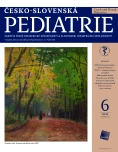-
Medical journals
- Career
Hypophosphatasia: A rare disease with an easy diagnosis and available therapy
Authors: Šumník Zdeněk; Souček Ondřej
Authors‘ workplace: Pediatrická klinika, 2. lékařská fakulta, Univerzita Karlova a FN v Motole, Praha
Published in: Čes-slov Pediat 2023; 78 (6): 325-329.
Category: Comprehensive Report
doi: https://doi.org/10.55095/CSPediatrie2023/047Overview
Hypophosphatasia (HPP) is a disease characterized by predominant skeletal involvement and multiple systemic manifestations due to reduced activity of tissue-non-specific alkaline phosphatase (ALP) in the serum. The incidence of severe forms of HPP in European populations is estimated at 1 : 300 000, with the frequency of milder forms being significantly more common, around 1 : 6300. HPP is one of the clinically heterogeneous diseases, leading symptoms typically vary by age at manifestation. The most severe, life-threatening forms are the neonatal and infantile forms. HPP can also manifest later in life, most commonly causing skeletal deformities, poorly healing fractures or arthropathy. Until 2015, treatment of these patients was symptomatic. The situation has changed with the development and availability of recombinant ALP (asfotase alfa), the indication for which is HPP, in which the first symptoms of the disease appeared before the age of 18 years, in order to treat the bone manifestations of the disease. This review summarizes the current knowledge on the diagnosis, therapy and prognosis of this disease and illustrates the most commonly used differential diagnostic procedures when assessing low ALP or clinical symptoms suspicious for HPP. Early diagnosis represents the most important preventive tool against the development of HPP complications.
Sources
1. Whyte MP. Hypophosphatasia - aetiology, nosology, pathogenesis, diagnosis and treatment. Nat Rev Endocrinol 2016; 12 : 233–46.
2. Martos-Moreno GÁ, Rockman-Greenberg C, Ozono K, et al. Clinical Profiles of Children with Hypophosphatasia Prior to Treatment with Enzyme Replacement Therapy: An Observational Analysis from the Global HPP Registry. Horm Res Paediatr 2023. doi: 10.1159/000531865
3. González-Cejudo T, Villa-Suárez JM, Ferrer-Millán M, et al. Mild hypophosphatasia may be twice as prevalent as previously estimated: an effective clinical algorithm to detect undiagnosed cases. Clin Chem Lab Med 202. doi: 10.1515/cclm-2023-0427
4. Schmidt T, Schmidt C, Amling M, et al. Prevalence of low alkaline phosphatase activity in laboratory assessment: Is hypophosphatasia an underdiagnosed disease? Orphanet J Rare Dis 2021; 16(1): 452.
5. https://alplmutationdatabase.jku.at/portal/
6. Weiss MJ, Ray K, Henthorn PS, et al. Structure of the human liver/bone/kidney alkaline phosphatase gene. J Biol Chem 1988; 218 : 12002–12010.
7. Hancarova M, Krepelova A, Puchmajerova A, et al. Hypophosphatasia due to uniparental disomy. Bone 2015; 81 : 765–6.
8. Watanabe A, Satoh S, Fujita A, et al. Perinatal hypophosphatasia caused by uniparental isodisomy. Bone 2014; 60 : 93–97.
9. Riancho JA. Diagnostic approach to patients with low serum alkaline phosphatase. Calcif Tissue Int 2023; 112(3): 289–296.
10. Turan S, Topcu B, Gökçe İ, et al. Serum alkaline phosphatase levels in healthy children and evaluation of alkaline phosphatase z-scores in different types of rickets. J Clin Res Pediatr Endocrinol 2011; 3 : 7–11.
11. Bronský J, Kalvachová B, Kutílek Š, et al. Doporučený postup České pediatrické společnosti a Odborné společnosti praktických dětských lékařů ČLS JEP pro suplementaci dětí a dospívajících vitaminem D. Čes-slov Pediat 2019; 74(8): 473–482.
12. Whyte MP, Greenberg CR, Salman NJ, et al. Enzyme-replacement therapy in life-threatening hypophosphatasia. N Engl J Med 2012; 366 : 904–13.
13. Whyte MP, Rockman-Greenberg C, Ozono K, et al. Asfotase alfa treatment improves survival for perinatal and infantile hypophosphatasia. J Clin Endocrinol Metab 2016; 101 : 334–342.
14. Whyte MP, Simmons JH, Moseley S, et al. Asfotase alfa for infants and young children with hypophosphatasia: 7 year outcomes of a single-arm, open-label, phase 2 extension trial. Lancet Diabetes Endocrinol 2019; 7(2): 93–105.
15. Shapiro JR, Lewiecki EM. Hypophosphatasia in adults: clinical assessment and treatment considerations. J Bone Miner Res 2017; 32(10): 1977–1980.
16. Seefried L, Genest F, Petryk A, et al. Effects of asfotase alfa in adults with pediatric-onset hypophosphatasia over 24 months of treatment. Bone 2023 : 116856. doi: 10.1016/j.bone.2023.116856
17. Yoshida K, Ishizuka S, Nakamura-Takahashi A, et al. Prenatal asfotase alfa-mediated enzyme replacement therapy restores delayed calcification in a severe infantile form of hypophosphatasia model mice. Eur J Med Genet 2023; 66(7): 104787.
18. Stürznickel J, Schmidt FN, von Vopelius E, et al. Bone healing and reactivation of remodeling under asfotase alfa therapy in adult patients with pediatric-onset hypophosphatasia. Bone 2021; 143 : 115794.
Labels
Neonatology Paediatrics General practitioner for children and adolescents
Article was published inCzech-Slovak Pediatrics

2023 Issue 6-
All articles in this issue
- Ze sbírky moderního českého a slovenského umění
- Co jsme psali
- Editorial
- Brief resolved unexplained event (BRUE)
- Emotionally unstable adolescents – a current challenge of child psychiatry and pediatrics
- Has prenatal ultrasound diagnosis of congenital kidney anomalies improved?
- Safety and changes in selected laboratory parameters in children with hymenoptera venom allergy treated with venom immunotherapy
- The current state of fetal imaging by magnetic resonance imaging
- Hypophosphatasia: A rare disease with an easy diagnosis and available therapy
- Renal involvement in pediatric inflammatory bowel disease
- Prehypertension and hypertension in children and adults: the effect of excessive salt and sugar consumption
- Udělení Brdlíkovy ceny 2023
- Vzpomínka na Zdenku Misařovou a její rodinu
- Rodiny dětí s postižením mohou využívat bezplatnou službu rané péče
- Pediatrická poezie
- Czech-Slovak Pediatrics
- Journal archive
- Current issue
- Online only
- About the journal
Most read in this issue- Brief resolved unexplained event (BRUE)
- Emotionally unstable adolescents – a current challenge of child psychiatry and pediatrics
- The current state of fetal imaging by magnetic resonance imaging
- Hypophosphatasia: A rare disease with an easy diagnosis and available therapy
Login#ADS_BOTTOM_SCRIPTS#Forgotten passwordEnter the email address that you registered with. We will send you instructions on how to set a new password.
- Career

